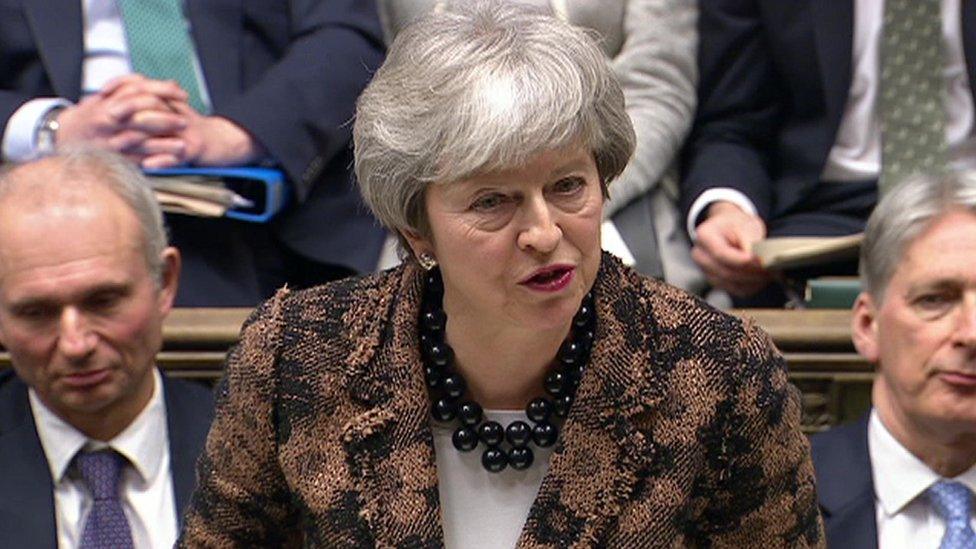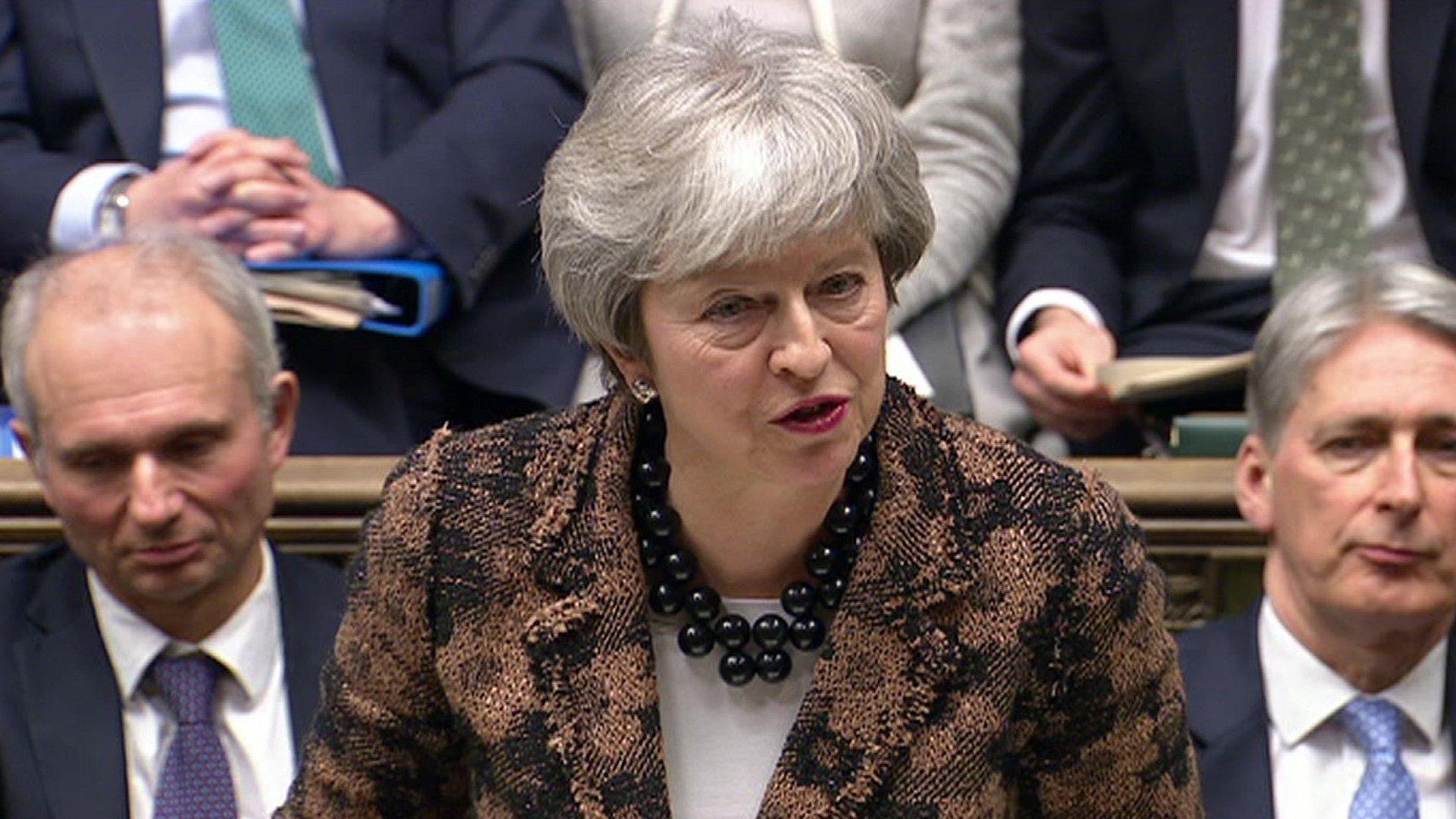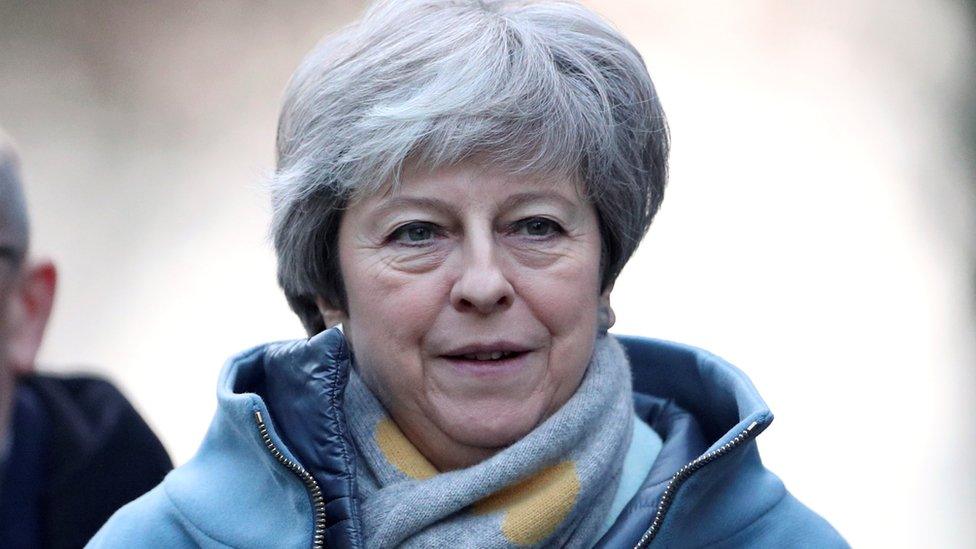Brexit: Theresa May to continue with DUP talks over backstop
- Published

Theresa May appeared in Parliament to face MPs on Monday afternoon, and set out her plan for the way ahead on Brexit
Prime minister Theresa May has said she will continue talking to the DUP and others who have concerns about the Irish border backstop.
She told MPs that she will then take the conclusions of those discussions back to the EU.
Mrs May made a statement to MPs on the way forward on Brexit after her planned deal was rejected by MPs last week.
The backstop is the "insurance policy" in the withdrawal deal.
It aims to ensure that, whatever else happens, there will be no return to a visible border between NI and the Irish Republic after the UK leaves the EU.
What has the prime minister said?
Mrs May set out her "plan B" way forward on Brexit in the House of Commons, amid deadlock over a proposed deal.
She also said she wanted to be "absolutely clear" that, despite some media speculation, the government would not reopen the Good Friday Agreement.
"I've never considered doing so and neither will I," she said.
She set out six issues she is seeking to address either in her Brexit deal or in the next phase of negotiations.
The prime minister also said the government would seek to give devolved nations a bigger role in the second phase of negotiations.
Theresa May says fees axed for EU citizens wanting to stay in UK
Northern Ireland has been without a devolved government for almost two years, but Mrs May said she will seek to see how elected politicians from Northern Ireland could be part of that process.
She hopes to win over Tory Brexiteer MPs and Northern Ireland's DUP, by resolving their concerns over the "backstop" plan for the Irish border.
Mrs May has also scrapped the £65 fee millions of EU citizens were going to have to pay to secure the right to continue living in the UK after Brexit.
She said she was exploring potential "movement" on the backstop that could secure the backing of a majority of MPs, in particular, concerns that it could become permanent and threaten the integrity of the United Kingdom.
What is the Irish border backstop again?
The backstop is a position of last resort, to maintain an open border on the island of Ireland in the event that the UK leaves the EU without securing an all-encompassing deal.
At present, goods and services are traded between the two jurisdictions on the island of Ireland with few restrictions.
The UK and Ireland are currently part of the EU single market and customs union, so products do not need to be inspected for customs and standards.
But, after Brexit, all that could change - the two parts of Ireland could be in different customs and regulatory regimes, which could mean products being checked at the border.
How has the DUP reacted to Mrs May's statement?
The DUP's leader at Westminster, Nigel Dodds, said it was "encouraging to see that the core issues" which led to the House of Commons rejecting the withdrawal agreement "are being focused upon in a really serious manner".
"We want to see a consensus in the House of Commons around a deal which works for every part of the United Kingdom but also the European Union and our neighbours in the Republic of Ireland," he added.
"The backstop is the problem and that is where the focus must lie."

Analysis: Blue Monday and the backstop
By Jayne McCormack, BBC News NI Political Reporter
21 January - aka Blue Monday - is deemed the most depressing day of the year.
It's somewhat ironic then that the prime minister was brought back to face MPs on this very date.
There was nothing dramatically new from Mrs May - but she confirmed it's all about the backstop now - and getting the DUP and other Brexiteers on board.
The tone from the DUP across the chamber, in response to what the prime minister said, was more conciliatory than we've heard in months.
But it insists "unless and until" she gets changes to the backstop, it won't back the Brexit deal.
Unfortunately for Mrs May, the Irish government and the EU say the backstop has to exist "unless and until" a better solution comes along.
This is high-wire acrobatics stuff: the question now is can Mrs May keep her balance and get a deal on the backstop that all sides can be happy with?

How have other NI parties responded?
Sinn Féin's Brexit spokesperson David Cullinane said: "Today was groundhog day for Theresa May.
"Instead of a Plan B we got a rehash of previous statements and a commitment to inclusivity that is two years too late."
SDLP leader Colum Eastwood said the British government's commitment to the Good Friday Agreement was "superficial".
"We have been through this time and time again - but Theresa May either doesn't get it or doesn't care. However, the SDLP, the EU and the Irish government are clear that the backstop is non-negotiable."
Alliance Party leader Naomi Long said the Prime Minister's Brexit statement was a "wasted opportunity".
"There is little point in wasting further time indulging those obsessed with changing or ditching the backstop," she said.
What is the latest from Brussels?
'Backstop should not have time limit'
Earlier, the Irish foreign minister rejected a proposal from his Polish counterpart for a five-year limit to the Brexit backstop.
Simon Coveney said he made it clear to Jacek Czaputowicz last month that setting a time limit was unacceptable.
He said he did not think the proposal reflected EU thinking.
"I made it very clear that putting a time limit on an insurance mechanism, which is what the backstop is, effectively means that it's not a backstop at all," Mr Coveney said.
Citizens
Speaking in Brussels, Mr Coveney said it was probably an attempt by the Polish foreign minister to be helpful.
"I can understand why a Polish minister would be concerned that we need to find solutions in relation to avoiding a no-deal Brexit, because there are many Polish people living in Ireland and indeed the UK.
"But I think Michel Barnier, Jean-Claude Juncker, Donald Tusk - these are the voices that speak on behalf of the European Union, and that's the Irish position."
The EU's chief Brexit negotiator, Michel Barnier, has said the withdrawal agreement, including the Irish border backstop, was "the best deal possible" for the UK in the Brexit negotiations.
In an interview with Irish broadcaster RTÉ, he also dismissed reports of a bilateral arrangement between the UK and Ireland, saying the EU negotiated as one team.
- Published21 January 2019

- Published21 January 2019

- Published21 January 2019
